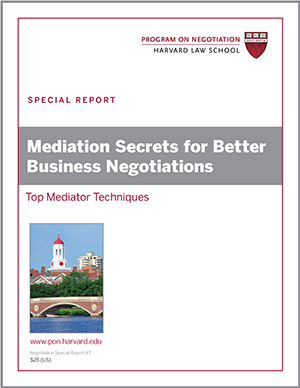
Advice for dealing with an unproductive mediator
Francesca Gino, Program on Negotiation faculty member and author of the bestselling book, Sidetracked: Why Our Decisions Get Derailed and How We Can Stick to the Plan, tackles this question from a Negotiation Briefings reader concerning how to deal with a mediator that is abrasive, dismissive, or even rude.
The role of the mediator in alternative dispute resolution (ADR)
QUESTION
I work for a firm that distributes products in South America. In the past few months, we have been in a very heated conflict with a customer who claims we did not fill an order as specified by our five-year contract. My firm disagrees. Because we seem to be interpreting our contract differently, I suggested to my boss that we try mediation, and the customer agreed. But the mediator we are working with, to my surprise, seems rather abrasive and off-putting. I was expecting someone with a warmer style. We would like to resolve this conflict quickly or go the arbitration route (for more on the differences between mediation and arbitration as dispute resolution processes, see also, The Definition of Mediation as a Problem-Solving Process and Examples of Alternative Dispute Resolution (ADR): How Mediation Works). Any advice?
ANSWER
A: Your desire to work with a mediator with a warmer style is understandable. Warm and friendly mediators are usually very effective at helping parties in conflict reach resolutions that are beneficial to each side. Such negotiators are good at expressing empathy with everyone’s viewpoint and building rapport to create a trusting atmosphere.
However, there may be a hidden benefit to working with a mediator with a more abrasive style in situations like yours, new research I conducted with my colleagues Ting Zhang (Columbia University) and Michael I. Norton (Harvard Business School) suggests.
In our studies, we assigned our participants roles in a heated conflict or dispute with another party and gave them the opportunity to interact with a mediator. In one experiment, some faced a “nice” mediator—one who spoke in a friendly tone and asked questions politely, for example. Others faced a mediator who was more abrasive, spoke gruffly, and used sarcasm. Still others faced a mediator with a more emotionally neutral style. Across different types of disputes and situations, we found that negotiators were more willing and able to reach an agreement when working with an abrasive mediator than with a nice or neutral one.
Why?
Because the abrasive mediators became common enemies who brought the adversaries together (for more information on advanced mediation techniques, see also Employee Mediation Techniques – Resolve Disputes and Manage Conflict with These Mediation Techniques and What Makes a Good Mediator?).
If this seems counterintuitive, think of parents of quarreling siblings who find themselves shouting, “I don’t care who started it. Both of you, go to your rooms!” At first blush, this strategy may sound less effective in defusing sibling tensions as compared with a calmer approach. Yet as many of us have experienced, such stern treatment can unite siblings against their tyrannical parents and even lead them to play nicely together after being banished. Similarly, in our research, we found that abrasive mediators can positively influence negotiators’ motivation and ability to resolve conflict.
Consider Martti Ahtisaari, a world-renowned mediator and former president of Finland who was awarded the Nobel Peace Prize as well as the Program on Negotiation’s Great Negotiator Award. Ahtisaari has used a variety of techniques and styles to resolve disputes, including a style that those who have worked with him have characterized as stern and firm. “Perhaps a little bit of theatrics help in some situations,” Ahtisaari told the Christian Science Monitor in 2006. “I can probe them, nudge them forward, sometimes be fairly tough.”
As compared with sternness, it’s worth noting that a downright hostile style could come at a significant cost if it forges only a temporary truce between negotiators or upsets them to the point of walking away. But, given your time constraints, your best course of action at this point may be to stick with your current mediator. His or her abrasive style just might lead your counterpart to view you as an ally and promote an agreement.
Francesca Gino
Tandon Family Professor of Business Administration
Harvard Business School
Author of Sidetracked: Why Our Decisions Get Derailed, and How We Can Stick to the Plan (Harvard Business Review Press, 2013)
Related Article: How Does Mediation Work in a Lawsuit? – For more information on advanced conflict mediation techniques.
Mediation Techniques for Conflict Resolution: Using Online Mediation
Originally published in the May 2016 issue of Negotiation Briefings.





Thank you for this article. After being told that I am too abrasive and need to smile more by a mediation coach, I was a little caught off-guard, primarily due to the negative association with abrasive personalities. It bothered me so much that I went right home and googled everything I could about abrasive personalities, because I could not figure out why she said I was abrasive.
This article makes me feel a lot better about the reality that some people will view me as abrasive regardless of how I actually am being, and that sometimes that conception of reality may be beneficial. I need not fear, any longer, the idea that I am doing something wrong if viewed as abrasive. Thank you!
I agree with this article, an abrasive mediator can make you keen to get on with negotiation and get out of there quickly but often you can walk away feeling like you were a bit of push over. Its important to have a plan of how much you are prepared to compromise your desired outcomes so you don’t feel you have been bamboozled.